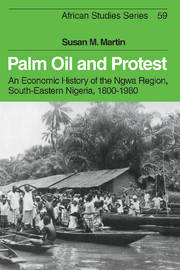Book contents
- Frontmatter
- Contents
- List of maps and figure
- Acknowledgements
- Abbreviations
- 1 Introduction
- 2 Ecology, society and economic change to 1891
- 3 The Ngwa and colonial rule, 1891–1914
- 4 The expansion of the oil palm industry, 1884–1914
- 5 The end of the boom
- 6 Cassava and Christianity
- 7 Authority, justice and property rights
- 8 Trade, credit and mobility
- 9 Production and protest: the Women Riot, 1929
- 10 Cash cropping and economic change, 1930–80
- 11 Conclusion
- Statistical appendix
- Notes
- Interviews conducted in the Ngwa region, 1980–1
- Bibliography
- Index
7 - Authority, justice and property rights
Published online by Cambridge University Press: 11 September 2009
- Frontmatter
- Contents
- List of maps and figure
- Acknowledgements
- Abbreviations
- 1 Introduction
- 2 Ecology, society and economic change to 1891
- 3 The Ngwa and colonial rule, 1891–1914
- 4 The expansion of the oil palm industry, 1884–1914
- 5 The end of the boom
- 6 Cassava and Christianity
- 7 Authority, justice and property rights
- 8 Trade, credit and mobility
- 9 Production and protest: the Women Riot, 1929
- 10 Cash cropping and economic change, 1930–80
- 11 Conclusion
- Statistical appendix
- Notes
- Interviews conducted in the Ngwa region, 1980–1
- Bibliography
- Index
Summary
Ngwa palm producers found themselves in an awkward situation when the terms of trade turned against them. The ecological considerations which had earlier tied them to palm produce, rather than cocoa or rubber, remained relevant. Furthermore, during the inter-war period it became increasingly evident that newer export industries like cocoa were almost as vulnerable as the oil palm industry to declining terms of trade. Nigerian import prices soared well above U.K. wholesale price levels during the post-war trading boom of 1918–19. In subsequent years, as U.K. wholesale prices and Lagos export prices collapsed, Nigerian import prices declined far more gently. Even in the depths of the 1930s depression, when U.K. wholesale prices were at 1913–14 levels, Nigerian import prices were 50 per cent above these levels. This phenomenon, combined with a secular decline in nominal export prices, ensured that the barter terms of trade fell as severely for cocoa as for palm produce between 1910 and 1940. Within Nigeria, only groundnut prices remained near their pre-war level throughout this period: but groundnut cultivation was hardly a viable option for Ngwa forest farmers.
Faced with these commercial realities, senior Ngwa men showed little inclination to switch their land, capital and labour resources into fresh uses. Instead, they concentrated on issues of ownership and power, and began to re-establish their claims to land and palms within the new colonial judicial system. In this chapter we will follow their fortunes during the 1920s and 1930s.
- Type
- Chapter
- Information
- Palm Oil and ProtestAn Economic History of the Ngwa Region, South-Eastern Nigeria, 1800–1980, pp. 78 - 89Publisher: Cambridge University PressPrint publication year: 1988



